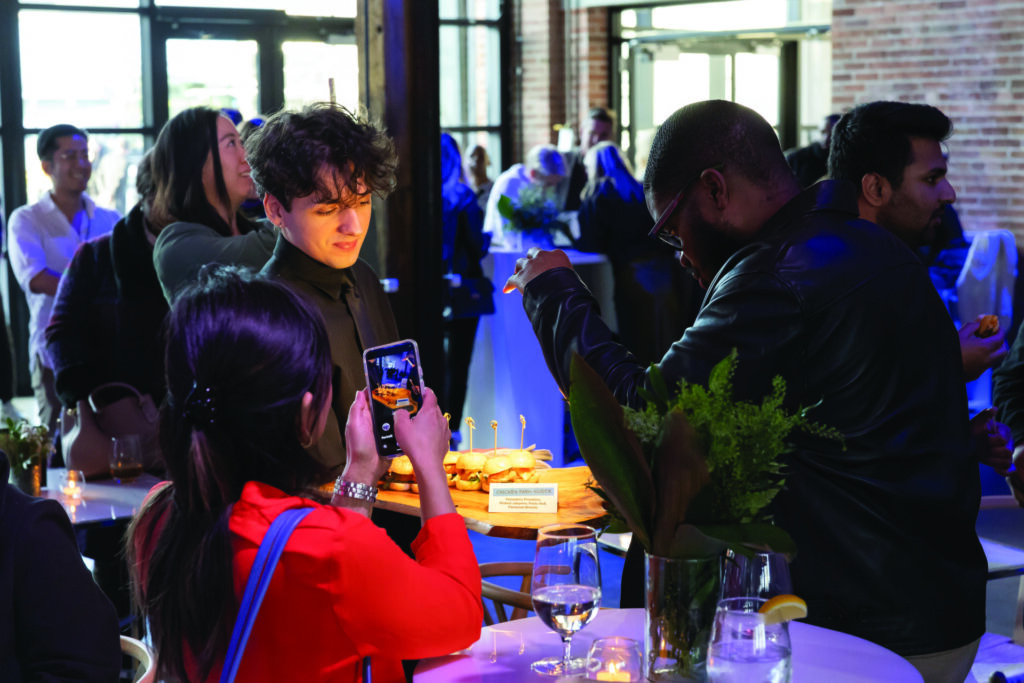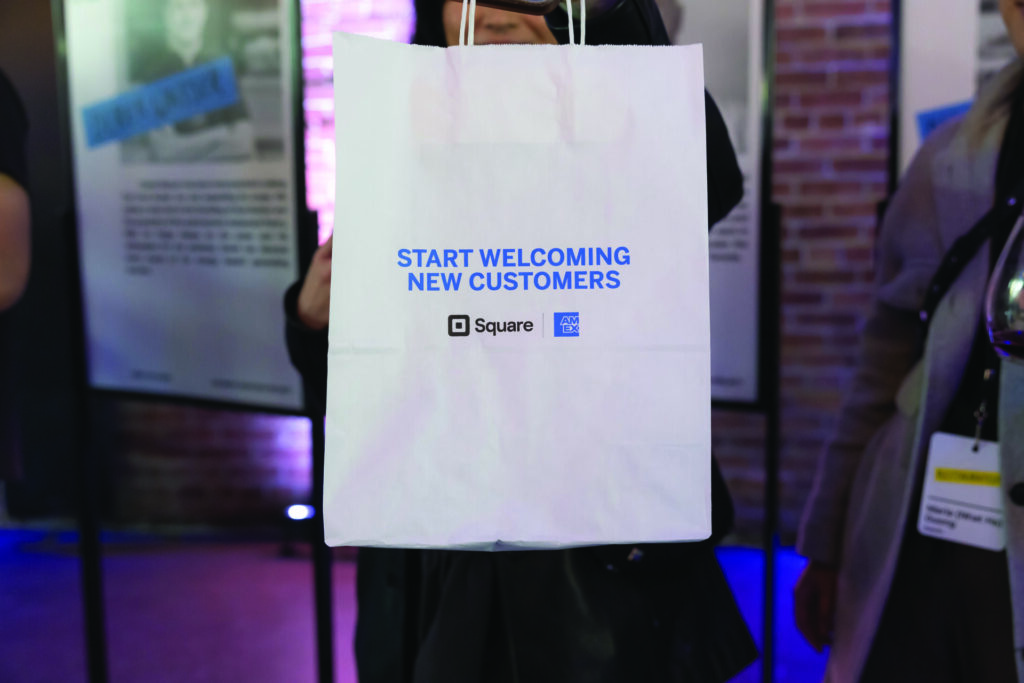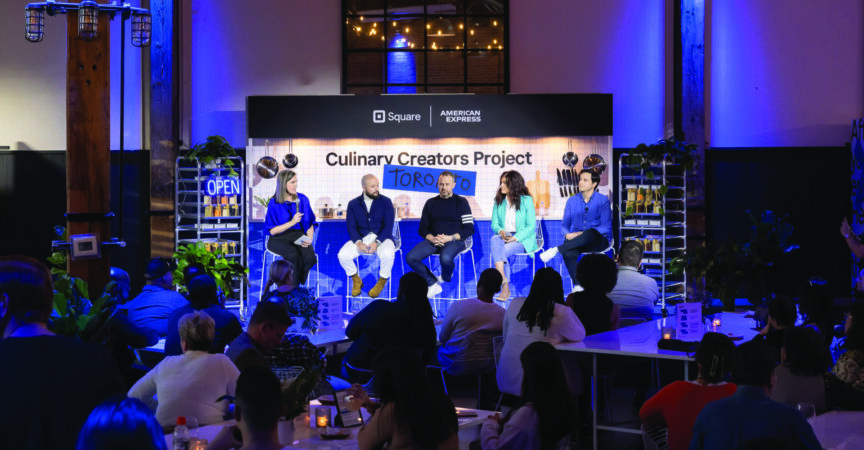Food for Thought
American Express Canada & Square bring restaurateurs together to share their big opportunities for growth.

At the end of March, Toronto’s culinary landscape witnessed an extraordinary evening brimming with advice, insights, and exclusive, curated dishes at the Steam Whistle Brewery in Toronto. The Culinary Creators Project is a remarkable gathering designed to bring the hospitality industry together to encourage collaboration and explore new ideas and relationships. The event showcased American Express® and Square’s pivotal roles as the key ingredients to success for restaurateurs.
Culinary Creators Project panellists from left to right: Karisa Marra (moderator), Partick Kriss, Craig Harding, Nicki Laborie and Derek Wasser
The Culinary Creators Project, presented by American Express and Square, is a platform that provided a space for hospitality leaders and luminaries to get to know their community, enjoy incredible chef-curated bites and gain valuable insights from a panel of four of Toronto’s top chefs and restaurateurs: Feast Forward: A Recipe for Restaurant Growth in 2024.
Moderated by Karisa Marra, Head of Sales at Square Canada, the panel featured Patrick Kriss, chef and founder of Alo Food Group; Craig Harding, founder and culinary director of Bar Prima, La Palma and Constantine, and co-host of Cooking Italy; Nicki Laborie, founder and owner of Reyna Hospitality Group; and Derek Wasser, Chief Operating Officer of The Food Dudes. These influential local chefs illuminated the path to uncovering new growth opportunities, streamlining restaurant operations, and diversifying and amplifying their brands.
Here’s what they had to share:
Efficiency & Automation
The hospitality industry is embracing cloud-based technologies to streamline operations and focus on core priorities, and the panelists are no exception to the trend. This includes apps for managing inventory and invoices, along with rapid, integrated payment systems. Interestingly, despite the hype, for these operators, the focus is more on automating tasks rather than introducing robotics. “We’ve suffered more in the last six months than we did during COVID,” acknowledged Nicki Laborie, highlighting the sector’s ongoing challenges. Yet, the heart of hospitality remains unchanged. As Laborie put it, “The hospitality business is all about love, and robots can’t do love.”
American Express and Square make running a restaurant smoother to enable chefs/owners to actualize their restaurant aspirations how they want and no matter where they are on their journey. Karisa Marra noted how technology, when used wisely, can support the essential human element in hospitality. “While people often think automation means cutting staff, many restaurant managers believe it actually benefits employees by freeing them from repetitive tasks, allowing them to focus on more important aspects of the business.” In person or online, American Express and Square can help restaurants take all kinds of payments quickly and securely, and provide access to helpful tools and personalized support to keep businesses growing.
Scaling & Diversification
Scaling a restaurant group is both an art and a science, often requiring a mix of gut instinct, opportunity analysis, and strategic planning. Nicki Laborie shared her approach: “In terms of knowing when to scale, I’ve always used my gut and good opportunities. I’ve always been taught to not miss an opportunity; to analyze it thoroughly and, if it works, try and make it happen.” Counselling caution, Laborie highlights the importance of ensuring the stability and success of existing operations before expanding further.
Patrick Kriss offered a slightly different perspective, emphasizing the need to push boundaries: “If you’re sitting on two restaurants and you feel comfortable and you feel you’ve got it made, it’s time to build another one. I think you’ve got to push yourself and be uncomfortable… If you’re uncomfortable, it means you’re on point.” He also stresses the value of scaling for team development, a point Derek Wasser expands on: “By continuing to evolve and grow and by opening a restaurant that might make you suddenly uncomfortable or that you’re scraping together the money for, or that you think is a bit rushed, you’re creating so much growth and development for your team, which ultimately is a really organic growth cycle for a hospitality company.”
Craig Harding adds another layer to the discussion, highlighting diversification opportunities. “We’re also branching out and going to our customers in their home, in venues – that’s been very important for us.” Laborie concurs, recognizing the profitability of events: “Events have great margins. I have a very active events team that sells.”
“It just has to come out of this weird place in your soul,” Harding admits. There may not be a one-size-fits-all playbook for scaling and diversification in the restaurant industry; however, the combination of strategic planning, team development, and seizing diversification opportunities can create a promising growth trajectory for restaurants.


Branding & Marketing
Effective branding and marketing are key to attracting and keeping customers in the hyper-competitive restaurant industry, the panel agrees, and should prioritize authenticity and consistency. Laborie also notes that revisiting old-school strategies can be a powerful way to reconnect with customers and boost engagement: “We’ve brought back promotions—we’re bringing back all of the marketing we used to do when we first opened.”
Kriss admits there’s an urgency to learn and do more to promote his restaurant group, especially as his business grows: “We need to introduce ourselves to new customers because we have catering, and then we have more restaurants and new restaurants, so for the last year we’ve been putting a lot of effort into it.” He also notes that more reticent operators (like himself) need to step outside their comfort zone to ensure the success of their brand.
Harding points to truth and clarity as key components of successful marketing: “I think it’s about telling a really authentic story. You’ve got to be honest from the get-go. If you’re not telling a story about your group or your restaurant that’s really tight and concise, people get confused.”
“We’ve always kept our brand very strong and very consistent,” says Laborie, who is a fan of brand continuity. “I’m very proud of the Reyna brand. I love what we’ve done with it, and it’s really grown and attracted a lot of people to our restaurants because of all those little details you keep in your branding and marketing across the board.”
Derek Wasser from The Food Dudes recalls their early dedication to brand and content creation: “There was always a huge drive to create content for parties through events we threw for ourselves, like the Block Party, festivals and having food trucks and making sure all of our cars were branded… I remember when we were only 15 or 20 employees, every single employee had a business card.” This proactive branding approach helped build a strong and visible identity from the start.

American Express & Square: A Recipe for Success
American Express and Square have proven themselves as steadfast allies of the food and beverage industry, and the Culinary Creators Project was a prime example of their commitment to fostering success within the hospitality sector.
American Express and Square’s partnership provides the key ingredients for success for restaurateurs, a benefit that can’t be overstated. Its broad acceptance, including on all Square tools, reinforces its status as a key player in the success of restaurants. Operators can rest assured that their customers can make quick, secure payments, both in-person and online.
To learn more about how American Express can support your business and Amex acceptance, please visit amex.ca/merchant









